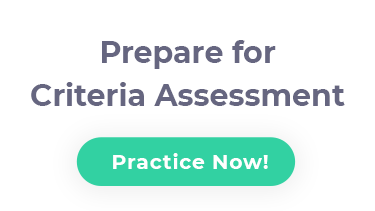Criteria Personality Test Online Preparation – 2025

What Is the Criteria Personality Test?
Criteria offers a range of personality assessment tools designed to help employers evaluate applicants’ personalities and assess their suitability for a specific job role. These assessments, when combined with other evaluation methods like interviews, provide employers with a comprehensive understanding of candidates’ behavior.
Types of Criteria Personality Tests
Criteria offers different personality tests, depending on the position for which the candidate is applying and the traits required for the job. Here are five personality assessments that Criteria offers:
- Employee Personality Profile (EPP): This assessment provides insights into an individual’s personality traits, work styles, and preferences. It takes ten to fifteen minutes and measures twelve traits: achievement, assertiveness, competitiveness, conscientiousness, cooperativeness, extroversion managerial, motivation, openness, patience, self-confidence, and stress tolerance. Employers can use this information to gauge how well a candidate might fit into a particular role, team, or company culture.
- Workplace Productivity Profile (WPP): The WPP is a ten-minute-long personality test that specifically assesses a candidate’s personality for following rules and being reliable. It also measures their ability to be conscientious in the workplace.
- Criteria Personality Inventory (CPI): This general assessment uses the Big Five Model to evaluate candidates based on traits such as agreeableness, conscientiousness, extroversion, neuroticism, and openness. It generally takes 15 minutes to complete.
- Customer Service Aptitude Profile (CSAP): CSAP is 15 minutes and focuses on evaluating an individual’s suitability for customer service roles. It assesses candidates based on interpersonal skills, communication, stress management, patience, diplomatic skills, cooperation, and more.
- Sales Achievement Predictor (SalesAP): Specifically designed for sales roles, SalesAP takes 15 minutes and evaluates individuals’ suitability based on sales-related skills like a customer-centric approach, negotiation skills, competitiveness, extrovert behavior, motivation, and adaptability.
In these exams, you will encounter around 140 statements, and you’ll need to choose from options like “Strongly Disagree,” “Disagree,” “Unsure,” “Agree,” and “Strongly Agree” in response to each statement. The results of these assessments contribute to a more comprehensive profile of your personality for employers.
Why Do Companies Use Personality Tests?
In the job world, personality tests are like helpful tools. They show how people like to interact, their personality traits, skills, preferences, and behaviors that stick around. These tests are made to look at parts of a person’s character that stay the same over time. A lot of these psychometric tests use the “Big Five” or “Five Factor” Model, which is a way of understanding different personality traits that research has shown can predict how someone will do at work. When companies use these tests for job candidates or employees, they want to figure out if the person’s character fits well with the job. The tests look at things like whether the person has the right traits or skills that match with what is needed for success in that job. These tests are beneficial for jobs where you have to talk to people a lot, like coworkers, the public, or customers. Some companies that use Criteria’s assessments include:
Tips and Advice
Preparing for these personality tests involves understanding the nature of these assessments and being mindful of the traits and skills they aim to evaluate. While personality tests are designed to assess inherent qualities and tendencies, there are a few general tips that may help you approach them more effectively:
- Understand the Traits: Review the key personality traits that the specific Criteria test is likely to assess. For example, if they are using the Big Five Model in the CPI, familiarize yourself with the traits it evaluates.
- Be Honest: Personality tests are designed to provide an accurate reflection of your personality. Trying to manipulate the results by answering in a way you think the employer wants may not be beneficial in the long run. Answer truthfully to ensure a better fit for both you and the organization.
- Reflect on Work Preferences: Consider your work preferences, communication style, and how you typically approach tasks and challenges. This self-reflection can help you provide more authentic responses during the test.
- Practice Self-awareness: Personality tests often gauge self-awareness. Reflect on your strengths, weaknesses, and areas where you believe you can grow. This self-awareness can enhance your ability to respond thoughtfully to test questions.
- Review the Company Culture: If possible, research the company’s culture and values. Understanding the organization’s expectations and environment can help you align your responses with what they are looking for in an employee.
- Take Sample Tests: Criteria or similar providers may offer sample or online practice tests. Taking these can give you a sense of the types of questions and the format used in the actual assessment. Preparation is key!

